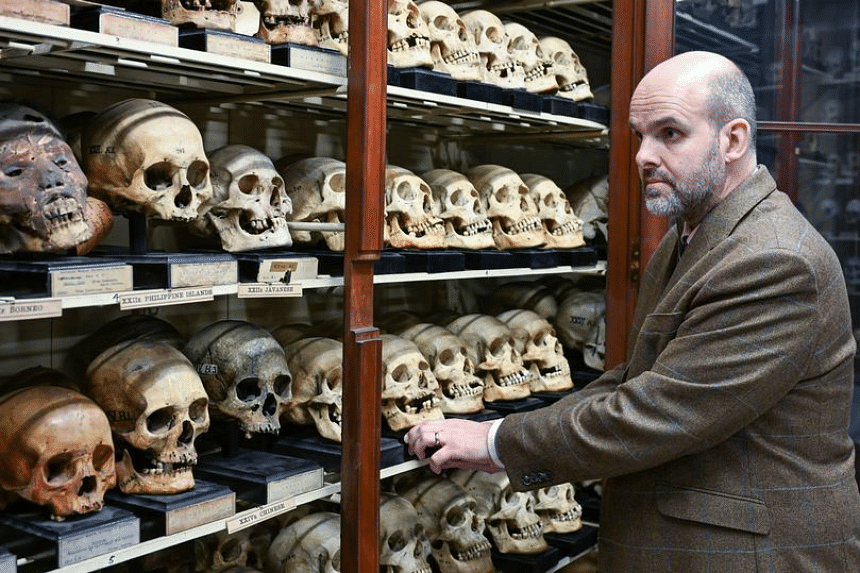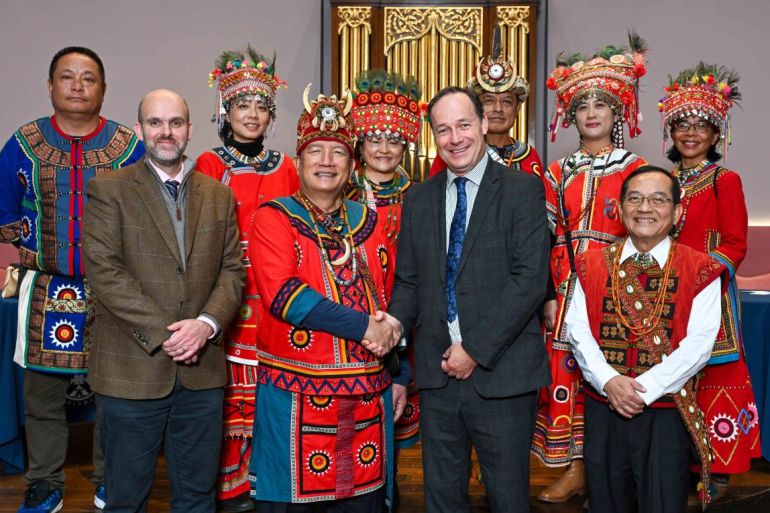
The skulls were thought to be taken as war trophies by Japanese soldiers who invaded southern Taiwan in 1874 and fought the Paiwan people.
MORE ON THIS TOPIC
PHOTO: UNIVERSITY OF EDINBURGH
TAIPEI - The skulls of four tribal warriors killed nearly 150 years ago have been returned by a Scottish university to a Taiwan indigenous community, in a move hailed as a “milestone of transitional justice”.
The skulls were thought to be taken as war trophies by Japanese soldiers who invaded southern Taiwan in 1874 and fought the Paiwan people. They were then passed on to the University of Edinburgh in 1907.
It was the first international repatriation of ancestral remains for Taiwan’s indigenous community, according to the island’s Council of Indigenous Peoples.
Friday’s repatriation was “rich with historical meaning and is an important milestone of transitional justice for indigenous peoples”, the council said.
Council minister Icyang Parod hoped the community could find solace and healing from the repatriation.
He said academic institutions and museums should work together to reflect on historical injustices and foster recognition of indigenous peoples’ rights.
The skulls will be placed in Taiwan’s National Museum of Prehistory, pending the Mudan community’s decision on a permanent resting place.
The remains belonged to four warriors from Mudan township, which is predominantly populated by the Paiwan people, the second-largest indigenous group in Taiwan, according to the university.
The skulls were taken to Japan by a US Navy officer who had accompanied the Japanese as a military adviser in the 1874 conflict, and they were eventually given to University of Edinburgh principal William Turner in 1907.
The repatriation request was made by Taiwan’s Council of Indigenous Peoples in November 2021 and granted the following July.
A traditional Paiwan service to honour the deceased was held before the remains were transferred in a formal handover ceremony on Friday.
Professor Tom Gillingwater, chair of anatomy at the University of Edinburgh, said the repatriation was the result of cooperation between the school and the Taiwanese community.
“We are committed to addressing our colonial legacy and this repatriation is the latest action we have taken in line with our longstanding policy of returning items to appropriate representatives of the cultures from which they were taken,” Prof Gillingwater said.
TAIPEI - The skulls of four tribal warriors killed nearly 150 years ago have been returned by a Scottish university to a Taiwan indigenous community, in a move hailed as a “milestone of transitional justice”.
The skulls were thought to be taken as war trophies by Japanese soldiers who invaded southern Taiwan in 1874 and fought the Paiwan people. They were then passed on to the University of Edinburgh in 1907.
It was the first international repatriation of ancestral remains for Taiwan’s indigenous community, according to the island’s Council of Indigenous Peoples.
Friday’s repatriation was “rich with historical meaning and is an important milestone of transitional justice for indigenous peoples”, the council said.
Council minister Icyang Parod hoped the community could find solace and healing from the repatriation.
He said academic institutions and museums should work together to reflect on historical injustices and foster recognition of indigenous peoples’ rights.
The skulls will be placed in Taiwan’s National Museum of Prehistory, pending the Mudan community’s decision on a permanent resting place.
The remains belonged to four warriors from Mudan township, which is predominantly populated by the Paiwan people, the second-largest indigenous group in Taiwan, according to the university.
The skulls were taken to Japan by a US Navy officer who had accompanied the Japanese as a military adviser in the 1874 conflict, and they were eventually given to University of Edinburgh principal William Turner in 1907.
The repatriation request was made by Taiwan’s Council of Indigenous Peoples in November 2021 and granted the following July.
A traditional Paiwan service to honour the deceased was held before the remains were transferred in a formal handover ceremony on Friday.
Professor Tom Gillingwater, chair of anatomy at the University of Edinburgh, said the repatriation was the result of cooperation between the school and the Taiwanese community.
“We are committed to addressing our colonial legacy and this repatriation is the latest action we have taken in line with our longstanding policy of returning items to appropriate representatives of the cultures from which they were taken,” Prof Gillingwater said.
AFP
UK university returns warrior skulls to Taiwan’s Indigenous Paiwan people
Edinburgh University, which was given the skulls in 1907, says the return is part of its attempt to address its colonial legacy.

Edinburgh University, which was given the skulls in 1907, says the return is part of its attempt to address its colonial legacy.

Pan Chuang-Chih, the mayor of Mudan, and Gavin McLachlan (right), from the University of Edinburgh mark the return of the skulls
[Courtesy of the University of Edinburgh]
Published On 4 Nov 2023
The University of Edinburgh has returned the skulls of four Paiwan warriors to Taiwanese Indigenous leaders, nearly 150 years after their deaths.
The repatriation is the first of its kind for Taiwan, according to the university, and comes as Edinburgh and similar institutions across Europe reckon with their colonial past.
“This repatriation is a culmination of international cooperation between the University and the Taiwanese community,” Professor Tom Gillingwater, chief of anatomy at the university, said in a statement.
“We are committed to addressing our colonial legacy and this repatriation is the latest action we have taken in line with our longstanding policy of returning items to appropriate representatives of the cultures from which they were taken,” he said.
The skulls were returned to representatives of Taiwan’s Council of Indigenous People and the head of Mudan township – a community in southern Taiwan close to where the warriors were killed in 1874.
The four Paiwan warriors were the victims of a Japanese punitive expedition to Taiwan carried out in retaliation for the massacre of 54 shipwrecked sailors from the Ryukyu Islands in 1871.
Known as the “Mudan Incident,” the conflict helped kick-start Japan’s colonial ambitions towards Taiwan, which it would annex from China’s crumbling Qing dynasty 20 years later.
The skulls were transported as trophies to Japan by an American military adviser, and then transferred through two other owners before they were given to the university in 1907.
Edinburgh “holds one of the largest and most historically significant collection of ancestral remains, notably skulls,” according to the university.
The Paiwan are Taiwan’s second-largest Indigenous community with a population of just over 102,000 people in 2020, according to government figures.
SOURCE: AL JAZEERA
Published On 4 Nov 2023
The University of Edinburgh has returned the skulls of four Paiwan warriors to Taiwanese Indigenous leaders, nearly 150 years after their deaths.
The repatriation is the first of its kind for Taiwan, according to the university, and comes as Edinburgh and similar institutions across Europe reckon with their colonial past.
“This repatriation is a culmination of international cooperation between the University and the Taiwanese community,” Professor Tom Gillingwater, chief of anatomy at the university, said in a statement.
“We are committed to addressing our colonial legacy and this repatriation is the latest action we have taken in line with our longstanding policy of returning items to appropriate representatives of the cultures from which they were taken,” he said.
The skulls were returned to representatives of Taiwan’s Council of Indigenous People and the head of Mudan township – a community in southern Taiwan close to where the warriors were killed in 1874.
The four Paiwan warriors were the victims of a Japanese punitive expedition to Taiwan carried out in retaliation for the massacre of 54 shipwrecked sailors from the Ryukyu Islands in 1871.
Known as the “Mudan Incident,” the conflict helped kick-start Japan’s colonial ambitions towards Taiwan, which it would annex from China’s crumbling Qing dynasty 20 years later.
The skulls were transported as trophies to Japan by an American military adviser, and then transferred through two other owners before they were given to the university in 1907.
Edinburgh “holds one of the largest and most historically significant collection of ancestral remains, notably skulls,” according to the university.
The Paiwan are Taiwan’s second-largest Indigenous community with a population of just over 102,000 people in 2020, according to government figures.
SOURCE: AL JAZEERA
No comments:
Post a Comment